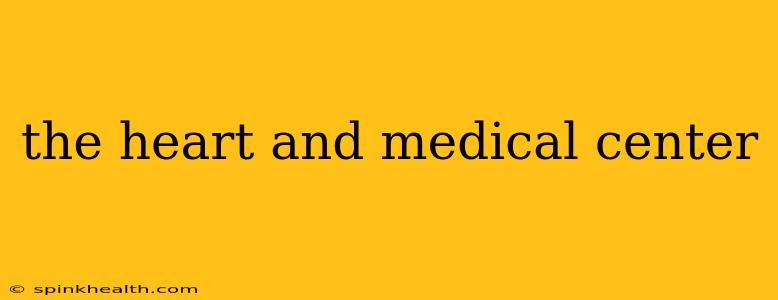The Heart and Medical Center: A Journey Through the Core of Healthcare
The human heart, a tireless muscle, beats relentlessly, a constant rhythm underpinning life itself. Understanding its complexities, its vulnerabilities, and its incredible resilience is a cornerstone of modern medicine. This journey explores the heart, its relationship to medical centers dedicated to its care, and answers some frequently asked questions surrounding cardiovascular health.
We'll delve into the intricacies of this vital organ, unraveling its functions and exploring the cutting-edge technologies and expert teams within medical centers that are dedicated to its well-being. From preventative care to life-saving interventions, we'll paint a picture of the comprehensive approach taken to ensure the health of this irreplaceable organ.
What are the main functions of the heart?
The heart, a marvel of biological engineering, is primarily responsible for circulating blood throughout the body. This seemingly simple function is, in reality, a complex symphony of coordinated actions. It receives deoxygenated blood from the body, pumps it to the lungs for oxygenation, and then distributes this freshly oxygenated blood to every cell, tissue, and organ. This continuous flow delivers vital nutrients and oxygen, while removing waste products like carbon dioxide. Without the heart's unwavering dedication, life as we know it wouldn't be possible. This intricate process is tightly regulated by electrical signals that control the rhythm and force of each heartbeat.
What are the different types of heart conditions?
The heart, like any complex machine, is susceptible to various malfunctions and diseases. The spectrum of heart conditions is vast, ranging from relatively minor issues to life-threatening emergencies. Some common conditions include coronary artery disease (CAD), where plaque buildup narrows the arteries supplying blood to the heart; heart failure, where the heart can't pump enough blood to meet the body's needs; arrhythmias, irregularities in heart rhythm; and congenital heart defects, present from birth. Valvular heart disease, affecting the heart's valves responsible for regulating blood flow, is another significant concern. Each condition requires a unique approach to diagnosis and treatment, underscoring the need for specialized medical centers dedicated to cardiovascular care.
How are heart conditions diagnosed?
Diagnosing heart conditions often involves a multifaceted approach, relying on a combination of advanced technologies and clinical expertise. Electrocardiograms (ECGs) record the heart's electrical activity, revealing rhythm irregularities. Echocardiograms use ultrasound to create images of the heart's structure and function. Stress tests assess the heart's response to exertion, while coronary angiography uses dye injected into the arteries to visualize blockages. Blood tests can reveal markers of heart damage or inflammation, providing crucial insights into the overall cardiovascular health. The integration of these diagnostic tools within a comprehensive medical center allows for swift and accurate diagnoses, crucial for timely and effective interventions.
What treatments are available for heart conditions?
The treatment landscape for heart conditions has undergone a dramatic transformation, thanks to advancements in medical technology and surgical techniques. Medication plays a central role in managing many conditions, controlling blood pressure, regulating heart rhythm, and lowering cholesterol. Minimally invasive procedures, such as angioplasty and stenting, can open blocked arteries, restoring blood flow to the heart. For more complex conditions, open-heart surgery might be necessary, involving procedures like coronary artery bypass grafting (CABG) or valve repair or replacement. Cardiac rehabilitation programs are crucial for recovery and long-term management, empowering patients to regain strength and improve their cardiovascular health. Medical centers often house specialized units focused on these different treatment modalities, offering comprehensive care tailored to individual needs.
What is the role of a medical center in heart care?
Medical centers dedicated to heart care are pivotal in providing comprehensive, high-quality services for patients with cardiovascular issues. These facilities often house specialized departments, including cardiology, cardiac surgery, and cardiac rehabilitation, allowing for a seamless transition between diagnostic procedures, treatment, and recovery. They typically employ teams of experienced cardiologists, surgeons, nurses, and technicians who are adept at handling complex cases and delivering cutting-edge treatments. The centralized nature of these facilities ensures efficient coordination of care, maximizing the effectiveness of interventions and improving patient outcomes. Access to advanced diagnostic tools and treatment options within these specialized centers offers hope and improved survival rates for individuals facing heart conditions.
In conclusion, the heart, the very engine of life, demands our attention and care. Medical centers stand as beacons of hope, equipped with the expertise and resources to diagnose, treat, and manage a wide array of cardiovascular conditions. Understanding the complexities of the heart and the multifaceted role of these medical facilities is crucial in promoting overall health and well-being. The ongoing advancements in cardiovascular care signify a continuing commitment to safeguarding this vital organ and ensuring a healthier future for all.

